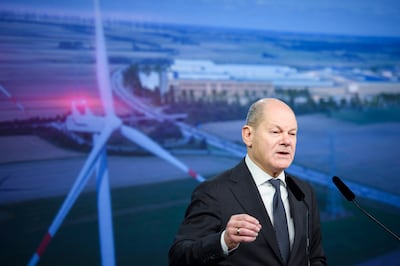Best known for gluing themselves to roads and defacing the Brandenburg Gate, hardline German climate activists are now competing at the ballot box.
The Last Generation movement has been approved to put up a list of candidates at elections to the European Parliament in June.
It is promising a campaign that "will not look like that of a traditional party", as it bids to become the EU's "fire alarm", warning politicians they are heading for climate disaster.
"We have a plan – and we will make ourselves known with more daring actions. We can tell you that much," it said in an email to supporters.
The Last Generation is similar to the Extinction Rebellion and Just Stop Oil movements in other European countries.
Its tactics of blocking roads and airports and defacing public artworks have been divisive in Germany. Chancellor Olaf Scholz last year called them "nutty".
There was dismay last autumn when Berlin's Brandenburg Gate, a symbol of German unity, was graffitied with spray-paint that proved tricky to remove.

Federal police say they do not classify the Last Generation as extremists, though its members are suspected of hundreds of criminal acts.
Mainstream Green party politicians have distanced themselves from the group, saying it does the cause of climate action more harm than good.
Last Generation activists, in turn, say the greens, social democrats and liberals in Mr Scholz's coalition have not done enough to tackle global warming.
"We do not want to enter the European Parliament because we've suddenly become well-behaved," said one of its candidates, Theodor Schnarr. "Instead, we want to mix things up in the parliament and make a noise.
"When we started our European election project two months ago, many thought we'd never manage it ... why shouldn't we surprise people a second time by entering the European Parliament?"
EU elections give small German parties an opening because they do not need a minimum 5 per cent of the vote to win representation, as they do in national elections.
In 2019, long shots including the Animal Protection Party, pan-European movement Volt and the eclectic Pirates Party each won a seat from Germany.

A new Turkish-linked party with connections to President Recep Tayyip Erdogan is pledging to fight for "people with foreign roots" in this year's campaign.
The Last Generation is running 12 candidates, led by spokeswoman Lina Johnsen. Germany, as the EU's most populous country, has 96 out of 720 seats in the parliament.
The German climate movement says the EU elections are particularly significant because "trend-setting decisions" for European climate policy are made in Brussels.
The EU parliament has less power than most national assemblies but its approval is often required for central planks of climate policy.
A new EU executive to be appointed after the June elections will have to set an emissions target for 2040 that is sure to prove controversial.
In Germany, ministers have a net-zero target for 2045 and recent figures forecasting a 64 per cent fall in emissions by 2030 gave hope it can still be achieved.
Mr Scholz's coalition has brought in policies to promote the use of wind and solar power, hydrogen and gas-free boilers to lower Germany's emissions.
However, the war in Ukraine and cost-of-living fears have frustrated its efforts, at one stage forcing Germany to place disused coal power stations back on standby to keep the lights on.


